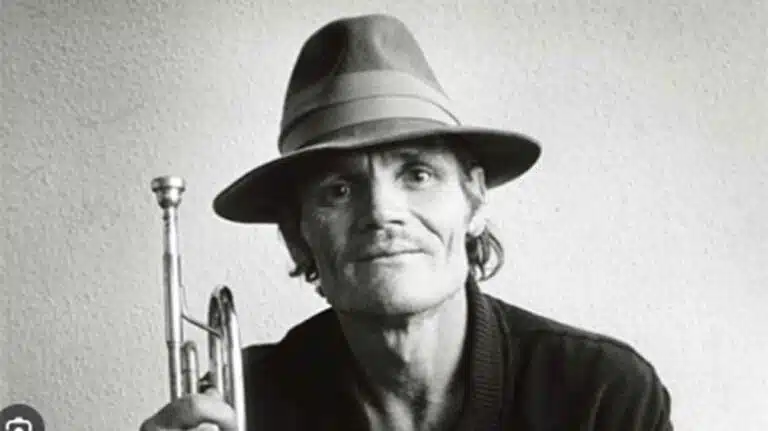Chet Baker | Heroin- & Cocaine-Related Fall

Chet Baker is remembered as a legend of American jazz music who captivated audiences worldwide from the 1950s onwards. But, despite his talent and success, he’s also a tragic figure who suffered from a prolonged and public struggle with substance abuse and drug addiction.
While Baker’s legacy lives on in recordings and the memories of those who worked with him, his life is nevertheless a lesson in the importance of getting help and dealing with substance abuse and addiction early and effectively, before the consequences become too great.
How Chet Baker Died
On May 13, 1988, at age 58, Baker was found dead on the pavement outside his hotel room in Amsterdam in the Netherlands, where he had been staying while touring.
While initially mysterious, the cause of death was eventually ruled as an accidental fall from either his hotel window or an adjacent balcony after he used a combination of cocaine and heroin, which were present both in his system and inside the room.
About Chet Baker
Chet Baker was born Chesney Henry Baker Jr. on December 23, 1929, in Yale, Oklahoma. The son of a professional guitarist and pianist, he showed promise as a musician from a young age.
Baker started playing the trombone at 14 but quickly switched to trumpet, with which he displayed a natural talent. His trumpeting continued after he joined the US Army in 1946, playing with army bands until 1951.
West Coast Jazz Scene
As a private citizen with a love for Dizzy Gillespie and Stan Kenton, Baker moved to Los Angeles and dove into the emerging West Coast jazz scene, playing with such legends as Stan Getz, Charlie Parker, and Russ Freeman and joining the Gerry Mulligan Quartet.
Baker’s smooth, elegant sound was well-liked, and the quartet recorded several professional records. Their hit song, “My Funny Valentine,” grew to become Baker’s trademark hit.
Personal Fame
As his public profile rose as part of the cool jazz movement, Baker’s personal fame followed. He quickly became known as a talented and charismatic trumpet player and singer with “movie star” good looks, earning him nicknames like “The Prince of Cool” and “The James Dean of Jazz.”
During his prime, he would regularly win public polls, music awards, and covers on magazines including Time and DownBeat.
Baker even appeared as an actor in the Hollywood film Hell’s Horizon in 1955, with his music featuring in a number of other films in the 1960s.
Heroin Abuse & Troubles
Baker’s professional success in the Pacific Jazz scene would come with a deepening addiction to heroin, which he used for the first time in the early 1950s.
This condition led to multiple arrests for drug possession and stints in jail. Alongside these legal troubles, his drug-fueled erratic behavior and unreliability repeatedly cost him gigs and recording contracts.
Baker would sometimes pawn or sell his instruments, steal, or even engage in prostitution to get drugs. In 1966, drug dealers outside a San Francisco nightclub shattered his jaw, broke his teeth, and made vocals and trumpet playing impossible for him for months afterwards.
Even after healing, Baker had to relearn how to play his instrument with dentures, which changed his embouchure. The lingering effects of heroin and other drugs also swiftly degraded his health and good looks.
Comeback
Though still struggling with drug abuse and legal issues, including forged prescriptions, Baker would stick with music. He moved to Europe in the late 1960s, collaborating with numerous other performers and then touring worldwide with special attention given to small jazz clubs and festivals.
Some of his best albums were recorded in the late 1970s and early 1980s while he was using methadone for his substance use. These include The Touch of Your Lips, Chet Baker in Tokyo, and Let’s Get Lost. But Baker’s comeback was abruptly cut short due to his sudden death.
Legacy & Influence
With a 40-year career and collaborations with jazz musicians the world over, Baker is widely regarded as one of the most original and influential jazz trumpeters and vocalists of all time.
He has been praised by such figures as Elvis Costello and Miles Davis, featured in the acclaimed documentary Let’s Get Lost by Bruce Weber, portrayed by Ethan Hawke in the 2015 film Born to be Blue, and studied in biographies by both James Gavin and Matthew Ruddick.
Recovery Is Possible
While Chet Baker did use methadone at times to control cravings and withdrawal symptoms, he was famously resistant to any other type of treatment or rehabilitation.
This ultimately contributed to his decades of stubborn substance abuse, legal and financial issues, and premature death.
However, recovery is possible if you rehab out for help. To learn about our professional treatment options, please contact us today.
Written by Ark Behavioral Health Editorial Team
©2024 Ark National Holdings, LLC. | All Rights Reserved.
This page does not provide medical advice.
Encyclopedia Britannica - Chet Baker, American musician and vocalist
DownBeat - Chet Baker’s Tale of Woe
National Institute on Drug Abuse (NIDA) - Heroin DrugFacts
NPR - Born To Be Blue: Chet Baker In 5 Songs
Questions About Treatment?
Ark Behavioral Health offers 100% confidential substance abuse assessment and treatment placement tailored to your individual needs. Achieve long-term recovery.
100% confidential. We respect your privacy.
Prefer Texting?
Our friendly support team is here to chat 24/7. Opt out any time.







 Learn More
Learn More








